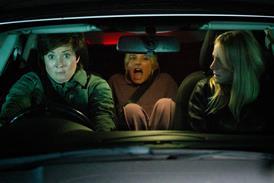LA-based TV visual effects facility Stargate Studios has opened an outpost at Ealing Studios to tap into the UK tax relief for high-end drama and export its unique brand of virtual location production.
It has begun work on Apocalypse Slough, the Working Title comedy drama for Sky 1, at the request of the indie’s parent NBC Universal.
Next up is Damien for Fox TV and Luther for the BBC, while it has previously handled shots for Doctor Who’s 50th anniversary special.
The UK wing will be headed by Michelle Martin, former VFX producer at Double Negative and head of production at Lola, and VFX supervisor David Serge, who also leads Stargate Malta. Martin is recruiting up to 10 compositors.
“We are not looking to take projects away from [facilities in] London,” said chief executive and founder Sam Nicholson. “We are looking to bring new production techniques to the market.”
While Stargate London will initially offer compositing and CG, the group’s speciality is a ‘virtual backlot’, designed as a low-cost alternative to shooting on location.
It has been used on series such as The Walking Dead, Grey’s Anatomy and NCIS.
Stargate has 29 teams in locations such as Canada and Cairo, shooting backdrops using a spherical rig of up to 14 Sony F55 or Canon 1D-C cameras. The 4K footage from each camera produces Doctor Who: Stargate’s UK facility worked on the 50th anniversary special images with horizontal resolutions of up to 50K.
This is stitched together and texture wrapped with additional CGI before being used as a backdrop to live action. The set-up was used in South Africa for backdrops for Apocalypse Slough.
The facility is able to render the vast volume of data using a highspeed data-management system and cloud network that links computing resources across its facilities in the US, Canada, Germany, Malta, the UAE and Mexico.
Stargate underwrites the cost in exchange for co-ownership rights to the production’s footage. Producers retain exclusivity to material “identifiable with their show”, while Stargate banks the remaining clips into its 6,000-hour library, which can then be used on other productions.
Nicholson said Stargate is looking to collaborate with indies to co-produce content using this technology.
“London is an expensive place to do business so we’ll be outsourcing work, such as rotoscoping, to our Maltese facility in combination with our Berlin and Cologne facilities,” said Nicholson.
“We want the highest level of art and design to come out of the UK, interfaced with the rest of the group.
“Everyone is looking for ways to increase the creative capacity to tell bigger stories, and for ways to control cost. There are very few facilities capable of completing a thousand shots in 10 days. I would consider us the fastest and highest-quality system out there.”

























No comments yet